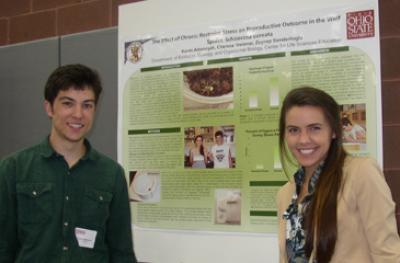The effect of chronic restraint- stress on reproductive outcome in the wolf spider, Schizocosa ocreata
Presenters: Kevin Adamczyk, Chelsea Vretenar
Advisor: Zeynep Benderlioglu
Abstract

Chronic exposure to stressors marked by unfavorable conditions in the environment has adverse effects on physiology and behavior of individuals. In non-human mammals, the restraint or immobilization stress has effectively been used to study the subsequent physiological, behavioral, and morphological changes in both adults and offspring. Here, we propose an invertebrate model of restraint-stress and the resultant reproductive outcome in the wolf spider, Schizocosa ocreata (Araneae: Lycosidae). Fourty-eight hours after mating, gravid S. ocreata females were either maintained in standard laboratory conditions, or restrained in a small plastic vial for 10 hours for 9 consecutive days. We are currently assessing the reproductive output regarding the eggsac production, eggsac viability, and clutch size. We predict that compared to the non-stressed females, the restrained females will have a diminished reproductive output as indicated by decreased number of eggsacs and surviving offspring. Our study will be the first arthropod model of a stress paradigm commonly used in mammals. If our results confirm our predictions, they will suggest a phylogenetically conserved stress response that can further be studied to understand the effect of environmental stressors on reproduction and fitness across taxa.
